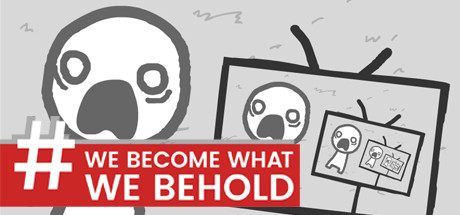
Looking at examples of games that fit the genre of ProSocial or transformative where the aim is to create a change in the behaviour of the player in terms of their values towards a certain area of society, in this instance a more political and media based type with a view on the "horror of the viral nature of divisiveness and tribalism."
Starting simply enough with a group of individuals on the screen with the only difference between them being the shape of their heads (circles and squares) the player uses the cursor as a camera taking pictures of behaviours they observe headlines are then crafter upon the tv screen in the centre which influences and has a direct consequence on the characters present. One example being if a photograph is taken of someone wearing a hat the headline "#hats are cool" appears and more characters begin wearing them to follow the trend. This is gradually elevated with more animosity being created between the circles and squares with the inevitable outcome being hatred and mass murder between the two types driven by fear perpetrated by the player and observed by the characters as media images showing the very deliberate connection with real life media images showing us images and text to create conventions for us to follow through virality and conformity to what we behold as truth.
Allowing for the player to be in control of the cursor gives them a sense of control over the situation and some sense of choice, they can photograph anything, yet only certain choices create progress and the static linear ending means that there will always be the same outcome. This is in relation to the message the game developers wish to get across but choose to allow some sense of choice so that players become engaged with the game and reactance cannot occur, where players would feel like their freedom was being hindered and would reject the messages of the game.









No comments:
Post a Comment